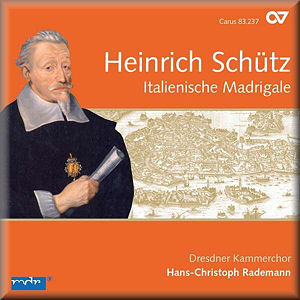 |
 |
|


alternatively
CD: MDT
AmazonUK
AmazonUS
Sound
Samples & Downloads |
Heinrich SCHÜTZ
(1585 - 1672)
Italian Madrigals
O primavera (SWV 1) [3:31]
O dolcezze amarissime d'amore (SWV 2) [2:39]
Selve beate (SWV 3) [2:46]
Alma afflitta, che fai (SWV 4) [2:46]
Così morir debb'io (SWV 5) [3:08]
D'orrida selce alpina (SWV 6) [3:02]
Ride la primavera (SWV 7) [3:28]
Fuggi, fuggi, o mio core (SWV 8) [2:26]
Feritevi, ferite viperette mordaci (SWV 9) [3:12]
Fiamma ch'allaccia (SWV 10) [2:35]
Quella damma son io (SWV 11) [2:38]
Mi saluta costei (SWV 12) [3:03]
Io moro, ecco ch'io moro (SWV 13) [3:14]
Sospir, che del bel petto (SWV 14) [3:16]
Dunque addio, care selve (SWV 15) [4:06]
Tornate, o cari baci (SWV 16) [2:29]
Di marmo siete voi (SWV 17) [2:31]
Giunto è pur, Lidia, il mio (SWV 18) [2:51]
Vasto Mar (SWV 19) [3:38]
 Dresdner Kammerchor/Hans-Christoph Rademann
Dresdner Kammerchor/Hans-Christoph Rademann
rec. 10-14 June 2010, Evangelische Kirche St. Marien, Dohna, Germany.
DDD
Texts and translations included
 CARUS 83.237 [57:21]
CARUS 83.237 [57:21] 
|
|
|
The Italian madrigal was one of the most important musical genres
of the second half of the 16th century. Many composers contributed
to the genre, which also held great attraction for composers
from North of the Alps. Heinrich Schütz composed his madrigals
in 1611 and dedicated the collection to Landgrave Moritz of
Hesse. It was he who had given him the opportunity to receive
a thorough musical education and who had sent him to Venice.
The 19 madrigals which were printed as his Opus 1 were the result
of his studies with Giovanni Gabrieli.
It may be surprising that Schütz composed madrigals to
prove the fruits of his studies. Gabrieli is not exactly known
for his madrigals but rather for his polychoral sacred music.
But the madrigal was seen as the genre par excellence
for a composer to show his skills in the treatment of counterpoint.
And as Gabrieli was one of the last great representatives of
the stile antico this was at the heart of his teaching.
This is also what attracted Schütz and what would make
him consider Gabrieli as his hero all his life. This didn't
change even when at a later stage he met Claudio Monteverdi
and became acquainted with the stile rappresentativo.
In the preface of the Geistliche Chormusik of 1648 he
emphasised that for every composer it was essential to master
the classical polyphonic style before turning to the concertato
style. He wanted "to remind Germany's budding composers that,
before proceding to the concertante style, they should bite
on this hard nut [the motet style] (in which the true heart
and foundation of good counterpoint will be found) and pass
their first test in this way".
The madrigals not only prove Schütz's competence in counterpoint
but also his skills in setting a text to music. Like counterpoint
this was to become one of the main features of his oeuvre. Not
for nothing did he receive the nickname of musicus poeticus.
In the madrigals of the late 16th century composers aimed at
carefully translating texts into music. Through musical figures
they wanted to express words and phrases and their emotional
meaning. Schütz follows their example in his madrigals.
He makes use of the usual devices of his time to depict words
and express emotions. Among these are falling intervals and
dissonances to express sadness, grief and death, fast running
figures and coloraturas to express joy or movement ("flee").
He also followed in his Italian colleagues' footsteps in choosing
the poems for his settings. Most of them are by famous poets
like Giambattista Marino and Battista Guarini. Six of the poems
are from the latter's Il pastor fido. The last madrigal
is an exception. This text was written by Schütz himself,
proving not only his mastery of the Italian language but also
his considerable poetic talent. It is a laudatory poem for Landgrave
Moritz ("Gran Maurizio").
Here Schütz also pays tribute to the polychoral style of
his teacher. Whereas the previous 18 madrigals are for five
voices, the last madrigal is in eight parts, divided into two
'choirs'. The word 'choir' should not be taken literally. This
is no choral music, but rather vocal chamber music. Madrigals
were usually performed with one voice per part, and there is
no reason to perform them with a choir of 18 singers as in this
recording. It is not just for historical reasons that a performance
with solo voices is to be preferred. There is also a musical
case. The very precise expression of words and phrases comes
off much better with one voice per part. This way the various
lines of the polyphonic texture are also much easier to follow.
Moreover, a choir lacks the flexibility and agility of a group
of solo singers; not even a choir of the quality of the Dresdner
Kammerchor.
Their mettle comes to the fore in many recordings, including
the first volume of the Schütz Carus edition, a recording
of the Geistliche Chormusik. I reviewed the first release
here
and the reissue as part of the Schütz Edition was reviewed
here.
Sadly, in the madrigals, they fail on all accounts. To put it
bluntly: these performances are dull. Dynamically the singing
is rather flat, there is very little sign of accurate text expression
which should be a feature of these madrigals. Also the sound
lacks the necessary transparency. Too often the affetti
are under-exposed. It is a complete mystery to me why Rademann
or Carus have decided to perform these madrigals with a choir.
There are several alternatives which serve the music better:
Concerto Vocale (Harmonia mundi, 1984), the Orlando di Lasso
Ensemble (Thorofon, 1998) and Cantus Cölln (Harmonia mundi,
1999). The recording of The Consort of Musicke (deutsche harmonia
mundi, 1985?) may also still be available.
Johan van Veen
http://www.musica-dei-donum.org
https://twitter.com/johanvanveen
|
|












